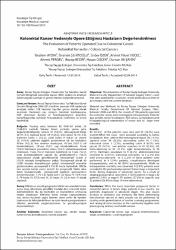Kolorektal kanser nedeniyle opere ettiğimiz hastaların değerlendirilmesi

View/
Access
info:eu-repo/semantics/openAccessDate
2015-04Author
Aydın, İbrahimŞehitoğlu, İbrahim
Özer, Ender
Yücel, Ahmet Fikret
Pergel, Ahmet
Bedir, Recep
Güçer, Hasan
Şahin, Dursun Ali
Metadata
Show full item recordAbstract
Amaç: Recep Tayyip Erdoğan Üniversitesi Tıp Fakültesi Genel
Cerrahi Kliniği’nde kolorektal kanser (KRK) nedeni ile ameliyat
edilen olguları sunmak ve güncel literatür eşliğinde tartışmak.
Gereç ve Yöntem: Recep Tayyip Üniversitesi Tıp Fakültesi Genel
Cerrahi Kliniği’nde 2008-2013 tarihleri arasında KRK nedeniyle
ameliyat edilen 138 hastanın kayıtları geriye dönük olarak
incelendi. Hastaların yaş, cinsiyet, tümörün lokalizasyonu,
ASA (American Society of Anesthesiologists) değerleri,
komplikasyonlar, tümörün histopatolojik incelemesi ve evresi
kaydedildi.
Bulgular: Yüzotuz sekiz hastanın 85 (%61.6)’i erkek, 53
(%38.4)’ü kadındı. Vakalar tümör yerleşim yerine göre
değerlendirildiğinde; rektum 31 (%22.5), rektosigmoid bölge
20 (%14.5), sigmoid kolon 39 (%28.2), inen kolon 16 (%11.6),
transvers kolon 3 (%2.2), çıkan kolon 9 (%6.5) ve çekum
20 (%14.5) şeklinde dağılım göstermekte idi. Bu hastaların
45’ine (%32.6) low anterior rezeksiyon, 43’üne (%31.1) sol
hemikolektomi, 29’una (%21) sağ hemikolektomi, 9’una
(%6.5) Hartmann prosedürü, 6’sına (%4.3) abdominoperineal
rezeksiyon, 3’üne (%2.2) transvers kolektomi ve 3’üne (%2.2)
total proktokolektomi yapıldı. Bu ameliyatların9’u (%6.5)
laparoskopik olarak gerçekleştirildi. İntraoperatif olarak 4
(%2.9) hastada komplikasyon gelişti. Postoperatif olarak 40
(%29) hastada komplikasyon gelişti. İntraoperatif mortalite
gözlenmezken, postoperatif 4 (%2.9) hasta kaybedildi. KRK’de
tanı anında tümör evresi önemli bir prognostik faktör olup
bizim hastalarımızda postoperatif patolojik spesmenlerin
evrelenmesinde 5 (% 3.6) hasta evre I, 22 hasta (% 15.9) evre
II, 79 hasta (% 57.2) evre III, 32 hasta (% 23.3) evre IV olarak
saptandı.
Sonuç: KRK’de en önemli prognostik faktör tanı anındaki tümör
evresi olup, ülkemizde genellikle hastalar ileri evrelerde teşhis
edilmektedirler. Bu da morbidite ve mortalitenin artmasına
neden olmaktadır. KRK’lerin erken evrede saptanabilmesi
için, birinci basamak sağlık hizmeti veren yerler ile beraber
toplumun da bilinçlendirilmesi ve rutin tarama programlarının
ülkemiz genelinde yaygınlaştırılması ile gerçekleşeceğini
düşünmekteyiz. Objective: The presention of Recep Tayyip Erdoğan University
Medical Faculty Department Of General Surgery Clinic’s cases
that were operated for colorectal cancer and to discuss them in
accompany with the current literature.
Material and Methods: In Recep Tayyip Erdoğan University
Medical Faculty Department Of General Surgery Clinic,
between 2008 and 2013, the records of 138 patients operated
for colorectal cancer were investigated retrospectively. Patients’
age, gender, tumor localization, ASA values, complications,and
histopathological examination of tumor and its stage were
recorded.
Results:
85 (61.6%) of the patients were men and 53 (38.4%) were
women.When the cases were assessed according to tumor
localization, they were in the rectosigmoid region 20 (14.5%),
sigmoid colon 39 (28.2%), descending colon 16 (11.6%),
transverse colon 3 (2.2%), ascending colon 9 (6.5%) and
cecum 20 (14.5%). Low anterior resection to 45 (32.6%), left
hemicolectomy to 43 (31.1%), right hemicolectomy to 29
(21%), Hartmann procedure to 9 (6.5%), abdominoperineal
resection to 6 (4.3%), transverse colectomy to 3 (2.2%) and
total proctocolectomy to 3 (2.2%) of those patients were
performed. In 4 (2.9%) patients, complications developed
intraoperatively, and in 40 (29%) postoperatively. While no
intraoperative mortality was observed, 4 (2.9%) patients were
recorded in the postoperative period. Tumor stage is important
factor during diagnosis of colorectal cancer. As a result of
staging postoperative specimens, 5 (3.6%) patient in stage I, 22
patient (15.9%) in stage II, 79 patient (57.2%) in stage III, and
32 patient (23.3%) in stage IV were determined.
Conclusion: While the most important prognostic factor in
colorectal cancer is tumor stage, patients in our country are
generally diagnosed in advanced stages. This also causes
increase in morbidity and mortality. We think determining
thecolorectal cancers in early phases can be performed by
country-wide generalization of routine scanning programmes
and raising of consciousness in the community together with
places giving primary care health service.
Source
Afyon Kocatepe Üniversitesi, Kocatepe Tıp DergisiVolume
16Issue
2Collections
- Kocatepe Tıp Dergisi [154]


















